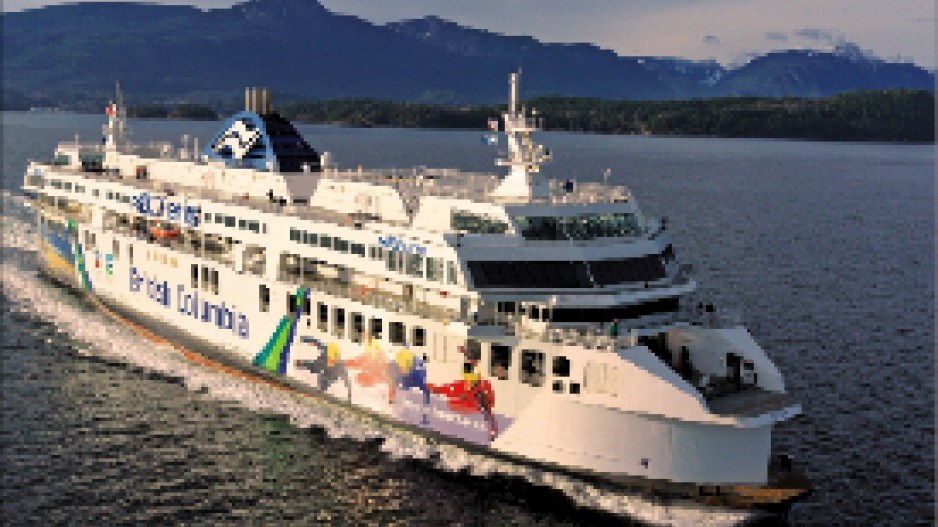BC Ferries is using smaller ships on key routes this winter and cutting costs to stem a rising tide of red ink, but its recent quarterly results paint a bleak picture for the future.
Although the embattled corporation posted net earnings of $57.3 million in its second quarter (a 5% increase compared with the same period in 2010), BC Ferries said its net loss for the year is expected to be larger than originally anticipated.
Outgoing president and CEO David Hahn said the company’s cost-containment strategy should save it more than $11 million this fiscal year, but its annual loss is now expected to be more than $20 million.
BC Ferries has not posted an annual net loss since 2003, which at that time totalled $28.7 million.
On top of that, the ferry operator – blaming multi-decade lows in passenger and vehicle traffic counts and Bill 14, a government review of ferry operations – doubts that it can return to profitability in 2013.
Ferries spokeswoman Deborah Marshall told Business in Vancouver the company is doing what it can to reduce its losses.
Earlier this month, BC Ferries deployed the Coastal Renaissance to Tsawwassen to handle its major route between the mainland and Vancouver Island for the winter and spring season.
The vessel is perfect for lower traffic volumes at this time of the year, Marshall said, and allows BC Ferries to save roughly $10,000 per day in operation costs.
“It is basically a cost-saving measure,” said Marshall. “The coastal class ships consume less fuel … and they also take fewer crew to operate.”
BC Ferries has also:
•instituted a hiring freeze on all non-essential positions;
•halted wage and salary increases for the next two years;
•reduced executive compensation;
•cancelled discretionary expenses;
•reduced the use of outside contractors;
•cancelled its Vancouver Canucks partnership; and
•delayed some capital expenditures.
Meantime, Hahn has elected to leave the corporation following a storm of controversy over a pension package that, when brought to light in media reports, drew the ire of Premier Christy Clark.
Marshall said although the ferry service is reducing costs, there have been no job cuts, but some employees have been selected for “early retirements” while others are being encouraged to take banked vacation time.
“If folks want to take a week off it’s a good time to do it,” she said.
BC Ferries is also looking for a private operator to take control of the passenger and vehicle route between Buckley Bay and Denman Island.
Marshall said BC Ferries would still ultimately be responsible for the route, but that a private operator would reduce costs and cut in half the number of people needed to operate the ferry.
Finally, the corporation has submitted an application to Transportation Minister Blair Lekstrom to eliminate roughly 400 round-trip sailings on major routes per year.
A spokesman for the ministry said the application is still being reviewed and no timeline for the decision had been established.
The proposed reduction on major ferry routes could also have a significant impact on businesses that rely on regular sailings to and from Vancouver Island.
“I’m extremely concerned … as soon as I heard about that I was not happy,” said Al Hasham, president and CEO of Maximum Express Courier and Freight. “As a business person … it will just hurt the economy.”
Hasham’s Victoria-based business, which employs 32 people, uses BC Ferries every day to transport goods between the Island and the mainland.
In recent years, however, rising fare costs have begun to erode his bottom line. Fares for a passenger vehicle and one occupant have climbed 37% in the last decade.
“We have to keep raising our prices, and the consumer at the end keeps on absorbing it … but what are we supposed to do? We can’t avoid sending a truck over, hence we have to keep paying that.”
Ace Courier president and CEO Jim McMullin said his company uses a Seaspan barge to move its freight between the mainland and Island, which he said is more cost effective in the long run than BC Ferries.
NDP transportation critic Gary Coons said he’s made a list of 13 areas where BC Ferries could save millions of dollars, including executive pay and bonuses, marketing and public relations costs and the BC Ferries Vacations centre in downtown Vancouver.
He doesn’t believe the cost-containment strategy goes far enough.
Said Coons: “It’s just a drop in the bucket.” •




